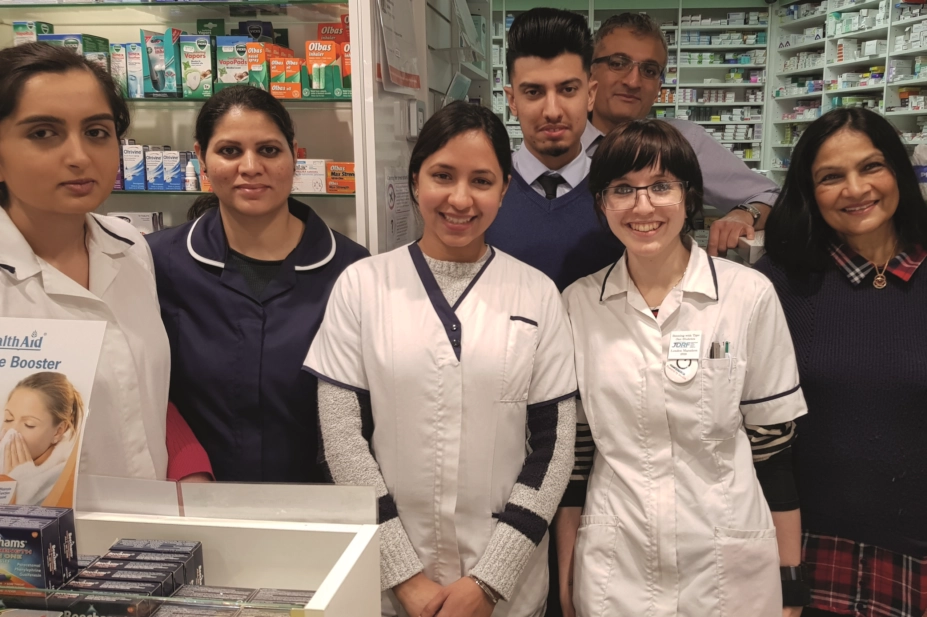
Courtesy of Roding pharmacy
Marc Krishek from North East London Local Pharmaceutical Committee (LPC) highlights the benefits of pharmacies taking on an apprentice and how LPCs can help.
Roding Pharmacy is a modern, well established independent community pharmacy offering a full range of NHS and private services to support the local community.
All staff are fully qualified, part of this is down to the free training that has been offered by apprenticeship programmes.
Taking on an apprentice
In 2013, a local college and LPC held an event about apprenticeships. The LPC had already done a lot of the ground work giving pharmacist and owner of Roding Pharmacy, Rashmi Bhatt, the confidence and security to take on an apprentice. Rashmi liked the idea of face-to-face training from qualified teachers and the opportunity for staff to mix and learn from others on day release. The apprentices always came back enthusiastic.
Working with the colleges has been really positive for Rashmi, as they take away a lot of the bureaucracy. There is a short health and safety check and a discussion about the apprenticeship process. The LPC then finds candidates for you with tutors carrying out assessments and providing feedback to the LPC.
Roding Pharmacy is now fully staffed with three apprentices who have the best of both worlds; being trained and supported by Rashmi and her team as well as being taught and supported in their apprenticeship programme.
Why undertake an apprenticeship?
Apprentice, Asim Karim, used to support his grandad with his prescriptions, picking them up at the pharmacy. This was the start of his interest in medicines and community pharmacy. He left school after his GCSEs. He picked up a leaflet from Connexions, did a two week trial and has been at Roding Pharmacy ever since. Asim wanted the experience of working and earning money, but he also wanted to get an education.
Going from school to working full-time in a professional environment and supporting patients was a bit of a shock, but Asim enjoys the challenge.
He has completed his Level 2 Pharmacy Services apprenticeship at one college and has completed his Pharmacy Technician apprenticeship at another college. He is now awaiting his paperwork to become a registered technician before he can complete the Accuracy Checking Pharmacy Technician Programme, which is fully funded by HEE.
Rabeeah Rashid, is learning different things every day. She has completed her Level 2 Pharmacy Apprenticeship and is now half way through her Level 3 Pharmacy Technician Apprenticeship Programme. She is also keen to develop her skills and do the Accuracy Checking Pharmacy Technician course so that she can develop her career in health.
Bableen Bhogal was a housewife before starting working in the pharmacy. Rashmi saw the commitment and enthusiasm of Bableen and put her on the apprenticeship programme to provide further support and get her qualified.
The teachers
The apprentices are full of praise for their teachers at the local college as they are really kind, helpful and knowledgeable. They go out of their way to help the apprentices who can discuss any issues with them and receive help with examination preparation.
Reasons to take on an apprentice
The apprentices at Rhoding Pharmacy advise all employers to take on an apprentice even if they think they are too busy. “You don’t get anyone busier than Rashmi,” they laugh, “and she has three apprentices.”
You are giving young people a chance. You are also giving back to your community, supporting people with being economically active in a very professional and supportive environment. When you employ local people, you are not only supporting the local economy, but your employees represent the people who visit your pharmacy, supporting you with understanding local cultures and language.
Taking on an apprentice represents a very good investment in your community pharmacy. You are able to mould and develop your employees, these people re-invigorate your business and the hugely subsidised training offers vey good value for money.
LPC support
Roding Pharmacy was supported by their LPC, who have been promoting apprenticeships to the community. As an LPC we also provide guidance and support to our members and have a strong relationship with local training providers to support the apprenticeship programmes.
It is important that community pharmacy has the right skill mix that supports clinical services and prevention to make itself indispensable to local people and future commissioning intentions.
Advice from North East London LPC
- Contact your LPC, they may be aware of local initiatives to support apprenticeship recruitment and activity
- Training providers are obliged to charge small employers 10% of cost for the apprenticeship training, negotiate to have this waived or reduced if the apprentice drops out early from the programme. There is £1,000 available to employers taking on 16-18-year olds
- Make sure that the training provider understands your requirements and sends you good quality candidates who are able to work in your pharmacy
- The apprentice is an employee, they will be part of your team. They should improve support to your patients, customers and services. Remember this is not work experience, an apprentice is your employee who receives accredited training one day per week.
You may also be interested in
The importance of diverse clinical imagery within health education

Government should consider ways to prevent ‘inappropriate overseas prescribing’ of hormone drugs, review recommends
